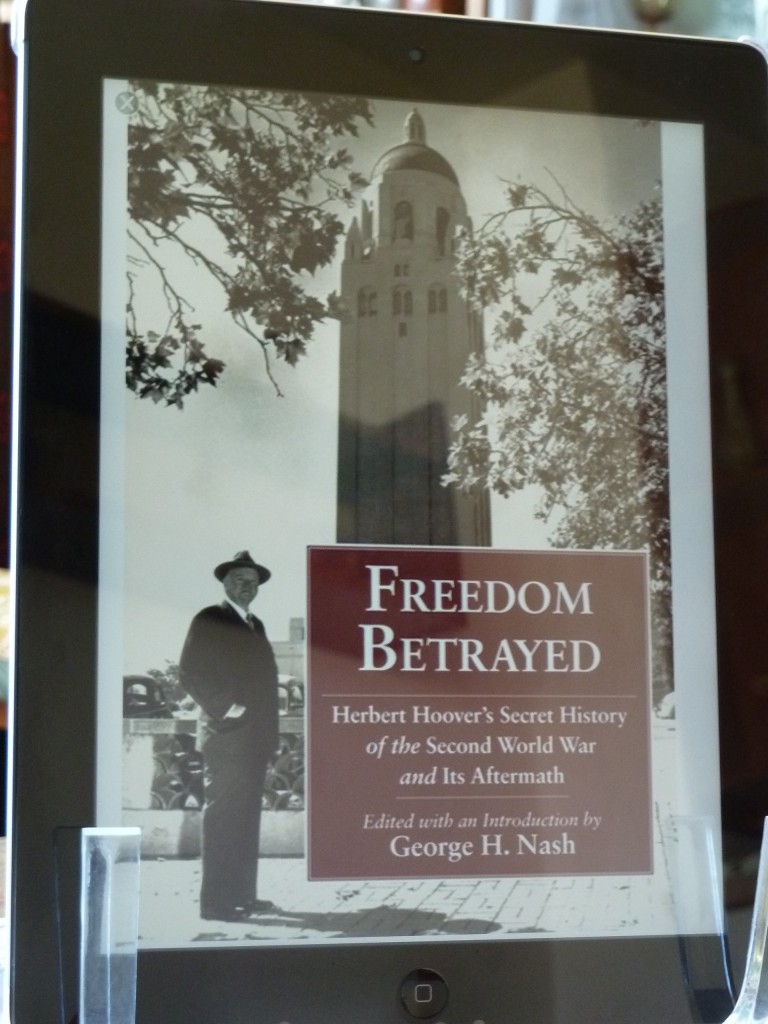Freedom Betrayed: Herbert Hoover’s Secret History of the Second World War and Its Aftermath, edited by Dr. George H. Nash
Book Review Part 1:
Referred to as the “Magnum Opus” in Hoover’s lifetime, Freedom Betrayed is both a memoir and a diplomatic history of World War II and the beginning of the Cold War. Meticulously researched, written and revised over a period of 20 years, Hoover’s most labor intensive literary achievement has finally been published after nearly fifty years in storage at the Hoover Institution Library and Archives at Stanford University.
After his failed attempt to secure the Republican nomination for president in 1940, Hoover recognized that his last chance in political office had passed. He turned to writing his memoirs, though his zeal to influence public opinion hadn’t waned. The years following his presidency saw him emerge as a vociferous opponent of FDR and his domestic policies which reached their pinnacle in the New Deal, and in the late 30’s Hoover’s attention turned toward the ominous developments in Europe, when he made every effort to keep America out of war.
In 1938 Hoover toured Europe as a visiting dignitary and was warmly received all over the continent, where the memory remained of his work as chairman of the A.R.A. (American Relief Administration) overseeing humanitarian relief and reconstruction of post-war Europe. Hoover met with Adolf Hitler, Neville Chamberlain and numerous other leaders including President Moscicki in Poland. He also visited Poland’s senior statesman, his old friend, Ignacy Paderewski in Morges, Switzerland. Hoover could see firsthand that Europe was quickly advancing towards war, with German militarization as the prime facilitator. Hoover’s notes from his conversations with European leaders would serve as the basis for Freedom Betrayed and are summarized in the early portion of the book.
Buy Freedom Betrayed
Originally conceived as separate books, Freedom Betrayed consists of three parts. In the first “volume” Hoover traces the rise of Communism and other international developments that culminate in the Nazi and Soviet invasion of Poland and the Baltic states and closes with America’s formal entry into the war after Pearl Harbor. The second volume is a diplomatic history of the war, focusing on the series of Allied conferences from 1941-1945, through the end of the war and Hoover’s assessment of Communist progress up to 1946. The third volume consists of four case histories of countries that had fallen to Communism, those being Poland, China, Korea and Germany. A lengthy appendix supplies additional documents relevant to Freedom Betrayed. It is appropriate to give Dr. George H. Nash, Hoover’s biographer, great credit for the tremendous task of editing the book, tracing it’s evolution over the two decades that Hoover wrote it and compiling it into the finished form that Hoover intended.
Herbert Hoover contends that freedom was betrayed by both American and British leaders through their deceitful maneuvering of America into war, thus supplanting the legal role of the U.S. Congress, and through their acquiescence to Communism, resulting in the enslavement of Eastern Europe and China. Hoover made numerous statements in print, public speeches and radio addresses discouraging American involvement in the war in Europe soon after it started in 1939. Hoover’s opposition continued when Germany attacked the Soviet Union in June,1941. In what he considered to be the most important speech of his life, he addressed the nation by radio imploring his fellow Americans not to allow themselves to be drawn into war on the side of the Soviets. In his view the two sides were equally despicable and that the two “devils” (as he sometimes called them) should be allowed to fight one another to exhaustion. Hoover speculated that even if the Soviet Union were defeated, the Nazis would never be able to consolidate their gains and the vast territory and disparate peoples under their control would be in a constant state of rebellion. Though opposed to American military participation in the war, Hoover did not stand idly by, but organized and led a significant effort to aid the suffering people in Poland, the Commission for Polish Relief, which operated until early December 1941.
In Hoover’s view the United States should have built up its defenses and prepared itself to enter Europe as a great stabilizing force, as it had after World War I. Only once the Nazis and Soviets had bludgeoned one another to near collapse would it be wise for America to play a role. Hoover’s view at the time fails to account for the genocidal plans of the Nazis against the Jewish and Slavic peoples, though he was correct in his contention that to that point Stalin already had the blood of millions on his hands, as a result of the “Holodomor“, the forced famine in the Ukraine in the early 1930’s, the numerous purges and (as has been recently learned) the murder of perhaps as many as 200,000 Poles by the NKVD as part of the “Polish Operation” in the late 30’s, a brutal example of ethnic cleansing. Ultimately, Hoover’s opinion is relegated to a historical “what if” as we’ll never know what might have been. What we do know is that President Roosevelt’s energetic support of Stalin helped to speed the defeat of Hitler, though at the price of the enslavement of tens of millions, a result that the Allied leadership seemed, at best, reluctant to protest, at worst assented to and facilitated.
Buy Freedom Betrayed
Recommended Reading:
–Freedom Betrayed: Herbert Hoover’s Secret History of the Second World War (review part 2)

One thought on “Freedom Betrayed: Herbert Hoover’s Secret History of the Second World War (review part 1)”